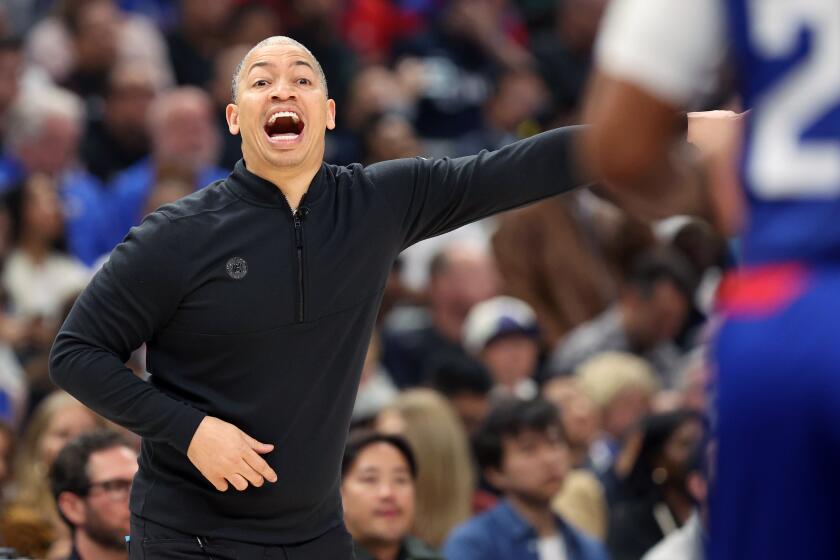Their Little League Experience Was Best and Worst of Times
- Share via
Ex-Little Leaguer Gregg Olson remembers shedding some tears when he lost games as a young boy. Ken Griffey Jr. got so angry with his Little League coach, he quit. Ernie Whitt had a similar problem with a strident high school coach, and he quit, too.
Other than those unpleasant recollections, these major-leaguers say that their earliest memories of playing baseball are mostly good ones.
“My parents never pushed me,” said Whitt, the veteran Baltimore Orioles catcher. “They just told me to go out and have fun, just enjoy the game.”
Perhaps it’s no coincidence that, to a man, major-leaguers say their Little League experiences were generally positive.
Mike Schmidt, the former Philadelphia all-star, said playing Little League baseball from age 7 to 12 “was the highlight of my year.
“For five years of my young life, I lived for that experience, lived for putting the uniform on and going to the little league park.”
Orioles catcher Bob Melvin said: “We lived four blocks away from the park, and if we had a Saturday afternoon game at 1 p.m. I had my uniform on at 8 o’clock.”
Olson, an Orioles reliever, called his Little League experience in Omaha “mostly good, but kind of traumatic.” He said he doesn’t remember his won-lost record or his batting average in Little League, but he certainly can’t forget the impact his father had on his fledgling career.
His father, a high school coach, attended most of his games. When Little League coaches running a tryout camp asked the children to run into the outfield and test their arms by throwing the ball home, the elder Olson told them to stop. He demanded the players warm up first to protect their arms.
He also limited his son to two curveballs per game before age 14.
“I was never one of the best pitchers,” Gregg Olson said. “Some kids were throwing curveballs and sliders when they were 12. But you probably never saw them again. If you watch the Little League World Series and see how those kids pitch, then you know why you rarely end up hearing those names again.”
But he acknowledges that at home, away from the organized games, he was pushed hard.
“I got all my yelling in the backyard,” he said. “When I look back, I hated every practice with my father. I appreciate the time my dad put into it, but when I was 10-13 years old, I’d be playing another sport and my dad would call me home and I’d pitch.
“If I had not made it, his pushing me would be a negative memory. A lot of kids rebel against that and quit because of it. That’s what ‘Field of Dreams’ is all about.”
Whitt had wonderful Little League experiences, but when he got to high school in suburban Detroit, he ran into a coach who screamed.
One day, Whitt had enough, unstrapped his catching gear and walked off the field.
“I felt really bad, because I was so frustrated and also trying to be a leader for the team,” Whitt said. “We talked it out a few days later. But I don’t think anyone ever needs to yell.”
But some big-league players didn’t mind a screaming Little League coach.
“I had always been warned about Mr. Fenner,” said Schmidt, who grew up in Dayton, Ohio. “You didn’t want to get drafted by Mr. Fenner. He yelled and screamed and held tough practices. Well, lo and behold, I was drafted by Fenner.
“What a positive effect that was on me. You have a tendency at that young age to daydream, to let your mind wander. You are not taught anything about concentration. You hear all the time about having fun, and that’s great. But between the ages of 10 and 12, habits begin to develop, and it’s good to develop a sense of seriousness, to be on time, to listen to the coach, to not just be sucking on a blade of grass in the outfield. That’s what Mr. Fenner taught me. I don’t have a problem with that.”
Schmidt, Whitt and Ken Griffey Sr. are former Little Leaguers who became Little League parents. Whitt said he is trying to help his two sons, ages 11 and 12, with a single-minded Little League coach back home in Michigan.
“He doesn’t understand why kids have to miss baseball practice because they have a soccer game,” Whitt said. “To me, a kid shouldn’t be forced to make a decision at this age. They should be able to play two sports right now. All this coach wants to do is win and that’s not right. I’ve called him to talk about it.”
More to Read
Go beyond the scoreboard
Get the latest on L.A.'s teams in the daily Sports Report newsletter.
You may occasionally receive promotional content from the Los Angeles Times.










